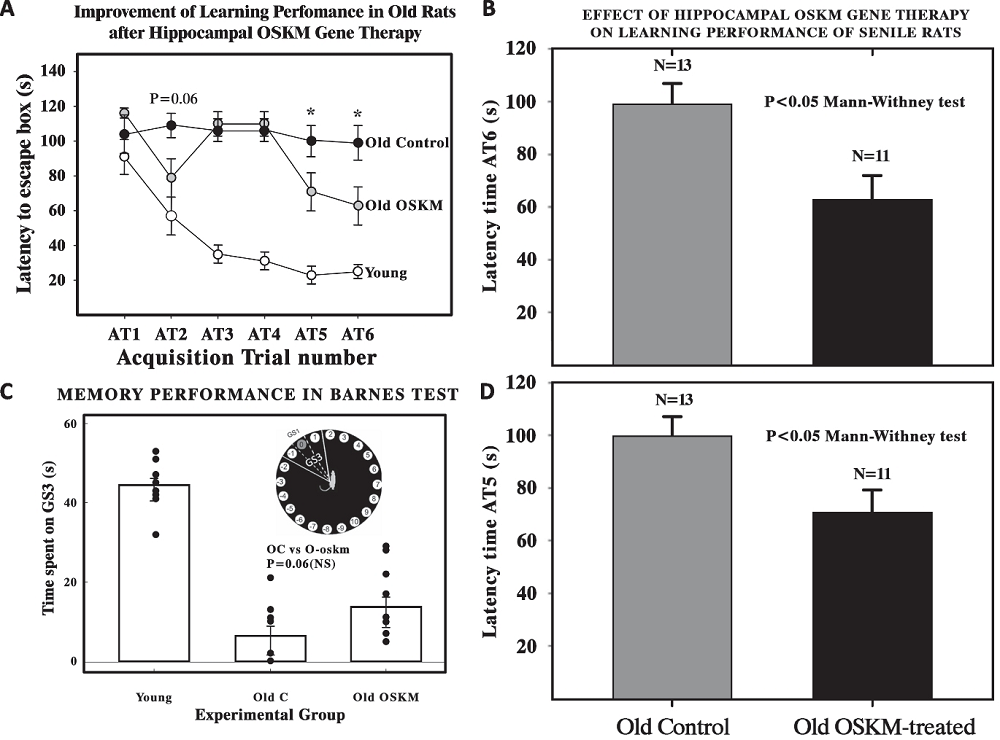Posted 26 July 2024 - 02:52 PM
Scientists have shown that prolonged, continuous expression of reprogramming factors counters cognitive decline in old rats and probably decreases their epigenetic age [1].
Reprogramming and cognitive function
Cellular reprogramming, the act of bringing differentiated cells back to a stem-like pluripotent state by expressing certain genes, has been one of the hottest subfields in longevity in recent years. Reprogramming, which can be either full or partial, also results in cellular rejuvenation.
Numerous studies have shown that reprogramming can increase healthspan and lifespan in animal models. However, in vivo reprogramming can also lead to disease and death due to harsh side effects [2]. Creating effective and safe reprogramming protocols is very much a work in progress.
One aspect that has not received a lot of attention is the impact of cellular reprogramming on age-related cognitive decline. In this new study published in GeroScience, researchers delivered viral vectors carrying the four “classic” reprogramming factors known as OSKM into the hippocampi of aged female rats. A month after the injections, the researchers ran tests to ascertain their effects on the animals’ cognitive function.
Unlike creating transgenic OSKM-expressing mice, introducing OSKM via viral vectors has a good safety profile, at least for now. As their inspiration, the authors mention “the pioneering results achieved by David Sinclair’s team employing OSK gene therapy in the retina of mice.” [3] Sinclair’s group had omitted the fourth factor, c-Myc, because of its cancer-causing (oncogenic) potential, but in this new study, the researchers used the full four-factor cocktail.
You can teach an old rat new tricks
The researchers employed the Barnes memory test to assess learning performance and spatial memory. During six acquisition training (AT) sessions, the rats were tasked with locating an escape box within two minutes, which was concealed beneath one of 20 holes around the edge of the platform.

Old untreated rats showed marked cognitive decline compared to young animals. While young animals learned the location of the escape hole quickly, and their results plateaued after three to five trials, their aged counterparts seemed to have lost this learning ability almost completely.
The OSKM-treated rats were somewhere in the middle, demonstrating notable improvement on the fifth and the sixth attempts, although still not on par with the young animals. After an improvement on AT2, the results worsened on AT3 and AT4, which the researchers do not have a definitive explanation for yet.
Steve Horvath, a renowned geroscientist currently with UCLA and Altos Labs, and the corresponding author on the study, told Lifespan.io that “there might have been a major stress response that initially negated the beneficial effects. Once the stress response subsided, the benefits became apparent. In other words, it could be a hormesis effect at the level of brain cells.”
The second lead author, Rodolfo Goya of the National University of La Plata in Argentina, suggested that the AT2 value might have been noisy and that the real statistically significant improvement in the study group occurred starting with AT5.
The expression of the OSKM genes in the dentate gyrus, a hippocampal region, was detectable for at least four weeks after the injection. According to the paper, “39 days of continuous OSKM expression induced no pathological alterations in the hippocampal parenchyma or other brain regions.”
Mild biological age decrease
The researchers then investigated whether the treatment had led to a decrease in biological age versus controls, as measured by three different epigenetic clocks. Such clocks, pioneered by Horvath himself, are based on DNA methylation patterns that are known to correlate with chronological age and mortality. According to the clocks, the treatment led to mild rejuvenation. The difference was statistically significant when a one-tailed p-value test was used – in other words, where only the possibility of the treatment lowering biological age, but not of increasing it, was considered.
“I find it very surprising that this gene therapy seems to rejuvenate both cognitive function and the methylation patterns of the hippocampus,” Horvath said. “This paper contributes to the growing body of literature suggesting that interrupted reprogramming could have beneficial effects on the brain.”
In our study, we specifically investigated the effects of OSKM gene delivery on hippocampal DNA methylation. We found suggestive evidence of epigenetic rejuvenation, corroborated by two separate epigenetic clocks designed specifically for rat and mouse brain samples. These findings align with numerous studies that have also reported signs of epigenetic rejuvenation in human and mouse cells and tissues following OSKM or OSK application. While our sample size was limited (n=8 old OSKM-treated samples versus n=6 old controls), these epigenetic clocks, trained using independent data, provide insights due to their accuracy.
To do this, we need your support. Your charitable contribution tranforms into rejuvenation research, news, shows, and more. Will you help?
Literature
[1] Horvath, S., Lacunza, E., Mallat, M. C., Portiansky, E. L., Gallardo, M. D., Brooke, R. T., … & Goya, R. G. (2024). Cognitive rejuvenation in old rats by hippocampal oskm gene therapy. GeroScience, 1-15.
[2] Parras, A., Vílchez-Acosta, A., Desdín-Micó, G., Picó, S., Mrabti, C., Montenegro-Borbolla, E., … & Ocampo, A. (2023). In vivo reprogramming leads to premature death linked to hepatic and intestinal failure. Nature Aging, 3(12), 1509-1520.
[3] Lu, Y., Brommer, B., Tian, X., Krishnan, A., Meer, M., Wang, C., … & Sinclair, D. A. (2020). Reprogramming to recover youthful epigenetic information and restore vision. Nature, 588(7836), 124-129.
View the article at lifespan.io











































